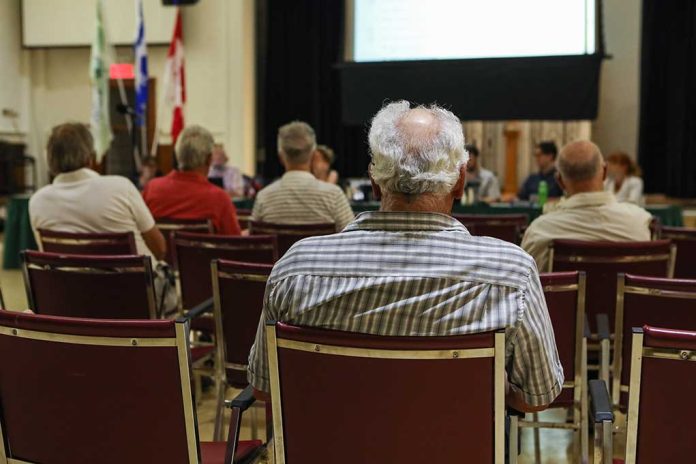
Michigan Secretary of State Jocelyn Benson violated campaign finance laws by conducting a political press conference in a government building, yet despite the clear infraction, Attorney General Dana Nessel admits she lacks the authority to hold her fellow Democrat accountable.
Key Takeaways
- Michigan’s Secretary of State Jocelyn Benson violated campaign finance law by holding her gubernatorial campaign launch inside a state building, a violation that carries potential penalties of up to one year in jail and a $1,000 fine.
- Attorney General Dana Nessel confirmed the violation but revealed she has no authority to penalize Benson, as the Department of State itself holds sole enforcement power, creating a glaring conflict of interest.
- Republicans have criticized the lack of accountability, with Senate Minority Leader Aric Nesbitt pointing out Nessel’s apparent selective enforcement of laws.
- The incident exposes a significant loophole in Michigan’s legal framework that allows elected officials to potentially escape consequences for violations they commit.
- Political activists are pursuing additional complaints with the State Board of Ethics and calling for legislative action to close the accountability gap.
Democrat Official Caught Breaking Her Own Department’s Rules
In a stunning display of political privilege, Michigan Secretary of State Jocelyn Benson was found to have violated campaign finance laws that her department oversees. The violation occurred when Benson used the Richard H. Austin Building in Lansing—a government facility—to announce her candidacy for governor. Despite rules explicitly prohibiting partisan political activities in government buildings, Benson proceeded with her press conference indoors, claiming it was moved from the planned outdoor location due to cold weather.
“Michigan Secretary of State Jocelyn Benson violated a campaign finance law her department oversees by hosting a campaign press conference in a government building, according to Attorney General Dana Nessel, a fellow Democrat,” stated Attorney General Dana Nessel in her findings.
When confronted by a reporter who noted that other candidates had been barred from using the same building’s lobby for political activities, Benson offered a dismissive response: “That’s good to know, but it’s never, certainly ever, come to my attention. This was an effort to make sure that no one’s getting frostbite.” This cavalier attitude toward the law she’s tasked with enforcing has raised serious concerns about selective enforcement and double standards within Michigan’s electoral system.
— Dalton Dvorak (@dalton_dvorak) April 10, 2025
The Convenient Loophole: No Authority to Enforce
In what many conservatives view as a convenient escape hatch for Democratic officials, Attorney General Nessel determined that while Benson clearly violated the law, she lacks the authority to impose any penalties. This remarkable situation stems from the fact that enforcement authority for these violations rests solely with the Department of State—Benson’s own department. The Michigan Campaign Finance Act allows for civil fines of up to $1,000, but when the violator controls the enforcing body, accountability becomes virtually impossible.
“Michigan’s Attorney General Dana Nessel said the state’s Secretary of State Jocelyn Benson has been found to have violated the Campaign Finance Act, but will face no penalty due to a quirk in the statute,” explained Dana Nessel.
Senate Minority Leader Aric Nesbitt highlighted the apparent hypocrisy in enforcement priorities: “Interesting how Dana Nessel thinks suing the President every week is within her scope of practice but enforcing election law in Michigan is somehow out of her hands.” This pointed observation resonates with many conservatives who have witnessed aggressive prosecution of political opponents while Democratic officials receive mere warnings or escape consequences entirely.
Failed Arguments and Calls for Reform
Benson’s campaign attempted to justify the violation by claiming she was acting in a personal capacity and exercising First Amendment rights, arguments the Attorney General’s office dismissed as “unpersuasive.” Nessel clarified that prohibiting partisan activities in government buildings serves a legitimate purpose: preventing interference with official business and ensuring unobstructed access for citizens. Despite acknowledging these principles, Nessel stopped short of pursuing enforcement, highlighting a troubling gap in accountability for elected officials.
“Prohibiting candidates from conducting press conferences and other partisan political activities in a government office building” has a reasonable purpose. It prevents interference with “entering, exiting, moving throughout, and conducting business in the building,” stated Dana Nessel in her findings.
Political activist Christian Charette expressed the frustration felt by many Michigan conservatives: “The entirety of the American justice system relies on the notion that no one is above the law. When the notion is violated … the people lose faith.” This sentiment captures the growing concern that Democratic officials operate under a different set of rules than ordinary citizens. Complainant Monica Ross-Williams plans to file additional complaints with the State Board of Ethics and has called for legislative action to address the enforcement gaps that allow officials to escape accountability.














